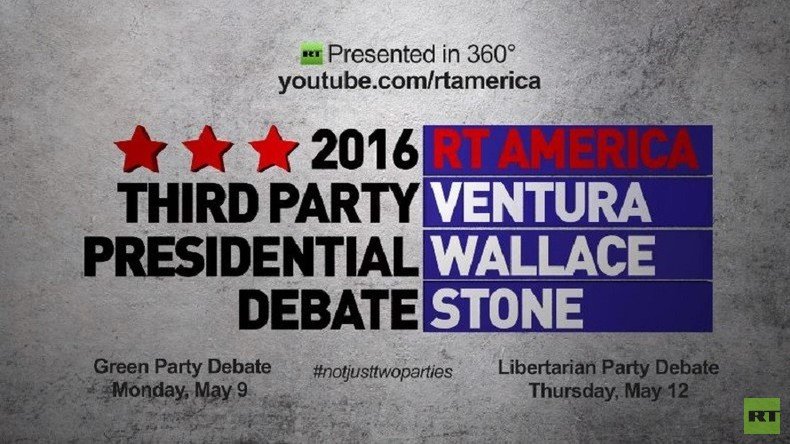Green Party candidates to face off in debate hosted by RT (WATCH LIVE)

Many Americans feel disenfranchised by the 2016 election’s options from both party, meaning that it may be the time for third parties to shine. Now, RT America is giving a voice to candidates from the left-wing Green Party in a televised debate.
Green Party candidates Jill Stein, Kent Mesplay and Sedinam Kinamo Christin Moyowasifza Curry are debating issues such as foreign policy, electoral reform and domestic policy.
We broadcast the debate in 360 on Youtube and on our web-site.
While the candidates are set to distinguish themselves in terms of strategy and policy goals, they agree that the two-party system doesn’t necessarily give Americans the representation that they are promised, especially with left-wing insurgent Bernie Sanders fighting an uphill battle against the Democratic Party’s nomination system.
“It is all but illegal to participate in US politics outside the twin titanic business parties. A majority of US citizens are disgusted with the status quo and want something new,” Mesplay told RT. “By nurturing real discussion and debate, RT America reveals an insistent international movement of polite dissent: the Green Party. Such visibility emboldens would-be voters who want a viable ‘third party’ in the United States.”
Jill Stein, who was the Green Party’s nominee in 2012, said in a statement that that added that the Green Party debate is good news for Americans who are looking for something beyond the duopoly that the Democratic and Republican parties hold.
“RT is breaking the two-party stranglehold on debates and beginning the open discussion the American people are clamoring for,” she said. “It’s a step towards real democracy and an inspiration for the millions of Americans who are ready for a new politics that puts people, planet and peace over profit."
Stein’s sentiments are supported by the data: More and more Americans are identifying as independents, and more are voting based on their dislike of a party, according Steven Webster, a political science PhD candidate at Emory University.
“We see sort of two contradictory things going on right now. One is that people are increasingly identifying as political independents, and another is that people are increasingly voting straight-ticket,” Webster told RT America. “The nature of partisan identification is changing. It used to be the case that we had positive attachments to parties. So, ‘I’m a democrat because I like their policy positions,’ or ‘my parents were both Democrats’. That’s not the case anymore. What we’re seeing is that people are motivated by their feelings of negativity towards the opposing party.”
The Green Party, the fourth-largest party in the United States, offers a policy platform that is solidly left-wing across the board that might appeal to disenfranchised supporters of Sanders, a self-described democratic socialist, should he not secure the nomination. A McClatchy-Marist poll released early last month showed that 25 percent of Sanders backers would not support Clinton in the general election, compared to 69 percent who would.
Many Sanders supporters claim that their candidate is running in a system that is rigged by party elites, a sentiment that the underdog Green Party couldn’t share more.
“Unfair ballot-access rules designed by Democratic and Republican lawmakers to block alternative-party candidates; election coverage by news media that perpetuates the myth that voters have only two choices; exclusion from forums and debates, including the two-candidate charade hosted by the Commission on Presidential Debates (CPD),” the party said in a statement.













